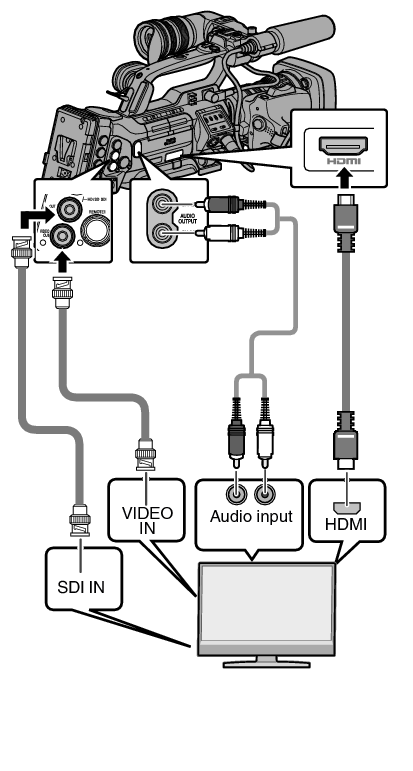Connecting External Monitor
TOPTo output live or playback video images and audio sound to an external monitor, select the output signals from the camera recorder, and connect using an appropriate cable according to the monitor to be used.
Choose the most suitable terminal according to the monitor in use.
[HD/SD SDI OUT] terminal:
Outputs either the HD-SDI signal or SD-SDI signal.
[VIDEO OUT] terminal:
Outputs composite video signals.
[HDMI] terminal:
Outputs HDMI signals.
Configure the settings in the [A/V Set] menu to match the monitor to be connected.
When [Network] is set to “On(HDMI Off)” or “On(SDI Off)”, either HDMI signal or SDI signal is output.

Select the output signal in [A/V Set]  [HDMI/SDI Out].
[HDMI/SDI Out].
When [Record Format]  [System] is set to “SD”, only SD-SDI signals are output.
[System] is set to “SD”, only SD-SDI signals are output.
To display the menu screen or display screen on the external monitor, set [A/V Set]  [Video Set]
[Video Set]  [HDMI Out Character]/[SDI Out Character]/[VIDEO Out Character] to “On”.
[HDMI Out Character]/[SDI Out Character]/[VIDEO Out Character] to “On”.
Connecting via SDI
Digital video signals, together with embedded (superimposed) audio signals and time code signals, are output for both the HD SDI and SD SDI signals.
User’s bit output from the [HD/SD SDI] output terminal is used as a flag to determine valid video signals. Therefore, accurate values will not be output.
The sampling frequency for embedded (superimposed) audio signals is 48 kHz. Time code of the built-in time generator as well as playback time code are also output.
Settings for SDI/Composite Down-Converted Output
You can select the method to “down convert” HD video images to SD images during SD SDI or composite output.
Set using [A/V Set]  [Video Set]
[Video Set]  [SD Aspect].
[SD Aspect].
The available modes include “Side Cut”, “Letter” (blackened at the top and bottom), and “Squeeze” (full size, compressed at the left and right).





